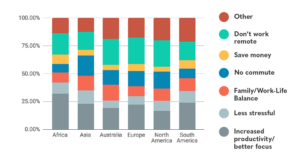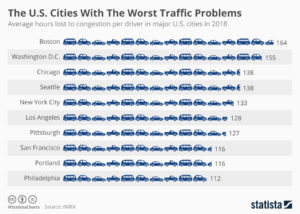Productivity & Colocation Are Not Interdependent
One of the myths still circulated about remote working is that is cannot deliver the same levels of productivity or engagement as when people are co-located in an office. Study after study, however, is showing that this is demonstrably not true. In fact, it is becoming more and more obvious that the opposite is true. Indeed Owl Labs which produces a global state of work survey found productivity as the number one reason people choose to work remotely in their 2018 report:

“The #1 reason that people choose to work remote is increased productivity/better focus, which was the #3 reason last year and the #2 reason was no commute, which remained the #2 reason this year. Productivity and focus remained a top reason to work remote and saving money remained a less important reason amongst respondents.”
This is also true of the myth that you can only create a great company culture by having people colocated in buildings. More and more companies are, however, again reporting that this is not the case. Indeed we are seeing remote companies starting to report being able to develop greater levels of engagement than traditional companies.
Indeed Forbes Magazin in 2018 reported “It’s also quite possible to build a great company culture and motivate people to care about the success of a company while allowing people to work remotely. For example, HelpScout — a 100% remote company – records 81% employee engagement score, a number considerably higher than most traditional companies manage to achieve.”
Gas Isn’t The Only Cost of Commuting
 One productivity item overlooked constantly is hours lost commuting. In many of the major metropolitan areas, it can be multiple hours per day. Ironically, as you can see from the Statista graphic, some places with the highest concentrations of tech companies also have the highest commute times – this underlines the paradox of technology companies being progressive in their products but old fashioned in their infrastructure approach.
One productivity item overlooked constantly is hours lost commuting. In many of the major metropolitan areas, it can be multiple hours per day. Ironically, as you can see from the Statista graphic, some places with the highest concentrations of tech companies also have the highest commute times – this underlines the paradox of technology companies being progressive in their products but old fashioned in their infrastructure approach.
Indeed the Independent newspaper in the UK highlighted a study in 2017 by the University of Cambridge, RAND Europe, Mercer, and VitalityHealth that examined over 34,000 British employees across all industries. Researchers found that workers with longer commutes were 33% more likely to suffer from depression, 40% more likely to have financial worries, and 12% more likely to report issues due to work-related stress. The same workers were inclined to get less than the recommended seven hours of sleep each night and are 21 percent more likely to be obese.
On top of all this, commuting is a big expense for most people and is rarely covered or reimbursed by their employer. Fuel costs, vehicle wear and tear, parking, tolls, bus, train, subway, tram, ferry tickets and so on. So when you combine the lost productivity, the potential health impact and the cost, it is hard to justify dragging people to a physical location if their actual job does not specifically depend on it.
Happy People Are Productive People
A Cebr report published in August 2019 found that among current remote workers, 73% of respondents report that flexible working improves personal wellbeing and the ability to balance work with outside activities. A large proportion of respondents also believe that remote working has a positive impact on their professional situation either by improving their job satisfaction level (69%) or boosting their professional development (60%).
The most recent Owl Labs 2019 State of Remote Work states: “We asked the remote workers we surveyed about the biggest reasons they decided to work remotely. They responded with: better work-life balance (91%), increased productivity/better focus (79%), less stress (78%) and avoiding a commute (78%).”
The work-life balance reason has grown since its 2018 report. This has always been something that office-bound workers have found difficult to achieve and often simply because logistics get in the way. It is hard to balance everything when commuting time is combined with long hours at the office. Once the constraints of commuting and offices are removed, remote workers now find that they can dedicate as much (and often more) quality hours to work and still have sufficient time for hobbies, activities, and family or whatever work/life balance means to them.

One underestimated but I think one of the most important impacts of remote working is on family dynamics. In the future it is likely we will see evidence of the hugely positive impact of parents being able to be there for breakfast, drop & collect their kids from school and have family dinners. Bonding opportunities that commutes and long hours spent at the office have eliminated for many workers. A reduction in latch-key kids and the opportunity for greater parental involvement during the critical years of a child’s development cannot but be a positive development. As any psychologist will tell you, people either remember and cherish the time parents spent with them over anything else or deeply lament the absence of it.
In the next post, I will talk about that tired old canard that you cannot build a cohesive culture with remote workers – spoiler alert – we have done it so I can talk from first-hand experience.
I will leave you, however, with one more quote from the Cebr report as a segue to my next post.
Very low proportions of respondents associate remote working with negative feelings, such as feeling disengaged, less productive or isolated.













Comments (3)
ths article is a superb and good one
Great piece.
great